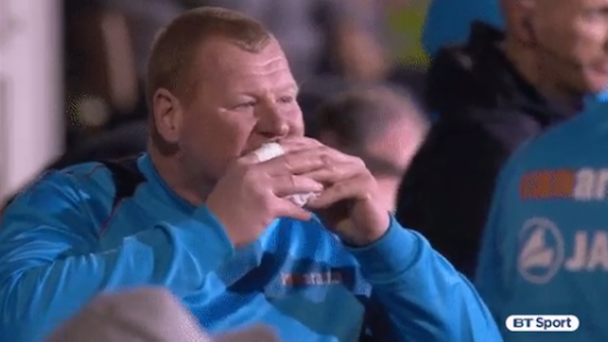Does ‘Piegate’ show that football has a gambling problem?
Who knew that a non-league footballer eating a pie on live TV would catapult British football into a crisis about its relationship with betting brands?

Wayne Shaw is a reseve goalkeeper who's image went viral thanks to this picture of him eating a pie during a game.
It certainly is a funny old game. But ‘piegate’ does raise some serious questions that I’ve been asking myself for some time – mainly, isn’t it time that football reduced its dependence on money from the gambling companies?
The problem has been building since 2005, when the Gambling Act allowed betting brands on television. Since then, the number of betting sponsors has steadily increased to the point that this season 10 of the 20 shirt sponsors in the Premier League are betting companies. Not only that, they account for a huge share of the advertising in TV coverage and in online activity too.
Interestingly, the top six Premier League clubs don’t have betting shirt sponsors. Arsenal, Manchester United, Manchester City, Tottenham, Chelsea, and Liverpool are still able to command big budgets from big brands.
It’s the lower-tier clubs that are struggling to attract interest from big-name brands and as a result are turning to betting companies for sponsorships. The result is that we are seeing fewer and fewer of the well-known consumer brands that previously used football’s top tier as a high-value brand building platform.
Surely, as the world’s richest and most-viewed league, EPL clubs should be commanding budgets from the biggest brands. Why can’t they? One conclusion has to be that clubs can’t offer A-list brand owners the kind of fully-integrated marketing package that they expect.
To do this, they need to think like media owners. Some do, but too many think short term and take the quick money. And it’s easy to see why. Awash with TV cash, the hunger for marketing returns isn’t the same as for other media owners.
So, as the bigger brands leave football, and their places are taken by more of the betting companies, there is a risk that the prestige of top-tier football as a marketing platform is increasingly eroded.
The likes of Samsung, Standard Chartered and Emirates genuinely use football to build their brands in the long term. However, in my view, the betting companies are using the sport more as a customer acquisition tool. That’s fine, but it doesn’t support the premium media profile that our best clubs should be offering. The exception to this is bet365 and Stoke City, this is a strategic brand building partnership which includes naming rights to the stadium and shirt sponsorship as part of a six year on-going relationship.
Given the global exposure and value of the Premier League, that would be a huge missed opportunity. It’s time for British football to get back into the marketing major league.
Antony Marcou is the chief executive at Sports Revolution.
